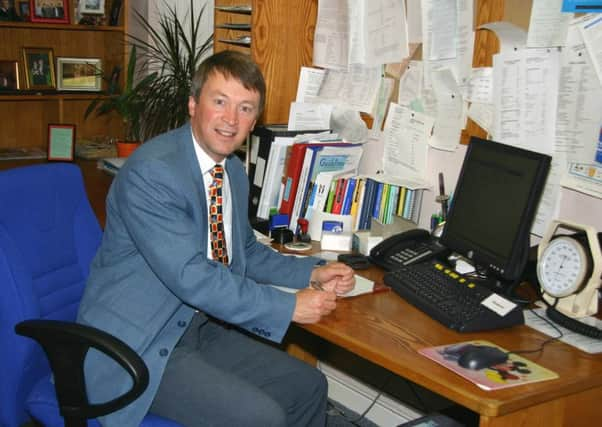Health and wellbeing column with Dr Anthony Clarke


More than 60 years on, the majority of people in our society value and love the NHS, which has been the envy of many countries.
It was therefore a great shock when the Mid Staffs Trust enquiry (the Francis Report) found that staff had treated patients and those close to them with what appeared to be callous indifference, concluding patients must be the first priority in all of what the NHS does and that patients should receive effective care from caring, compassionate and committed staff, working within a common culture.
Advertisement
Hide AdAdvertisement
Hide AdVocation has always been important in public services, whether in teaching, policing, nursing, doctoring or less high profile occupations. Vocation is what keeps the NHS functioning.
However, there has been a breakdown of relationships between junior doctors and Government and some believe vocation is being abused. How often do health professionals say no to unrealistic targets, how often do they fail to look after their own health while encouraging their patients to take care of themselves?
Many believe that workload in General Practice is unsustainable and increasing, with long-term conditions accounting for over 50% of GP consultations. NHS performance targets make holistic compassionate care an increasing challenge.
Sympathy, empathy, sensitivity, tolerating the distress of others and acting non-judgementally are more difficult to achieve and become more emotionally draining when health professionals work under great pressure.
Advertisement
Hide AdAdvertisement
Hide AdThe Kings Fund has warned that patient care will deteriorate as service and financial pressures become overwhelming. Last year three quarters of hospitals were unable to balance their books.
The NHS is operating on the very edge of its limits and many fear increasing fragmentation of health services as privatisation increases.
It is a matter of fact that some private companies have failed to succeed in running General Practice services due to financial loss and yet NHS England expects efficiency savings of £22 billion across the NHS by 2020, to reduce the amount of extra income required by the NHS to balance its books.
The NHS is now, in my opinion, run by accountants. This is due to the huge financial pressures of an ageing population and the Government’s desire to curb UK spending on health. NHS England has failed to debate at national level what can or cannot be provided by a cash strapped health service, preferring to delegate rationing of healthcare to Clinical Commissioning Groups (CCGs) at locality level and thereby creating a post code lottery of health provision for certain conditions.
Advertisement
Hide AdAdvertisement
Hide AdThe crisis in funding of social care has in turn placed pressure on hospitals, which now have half the number of beds to cope with twice as many admissions compared to 30 years ago.
The current tension between quality of care and financial performance has been further exacerbated by a workforce crisis in Primary Care and our A+E departments.
NHS England has failed to plan for and recruit the necessary number of doctors and nurses over the past 15 years and is now hoping to plug the gaps with pharmacists, physician’s assistants and paramedics. We have already seen a considerable (and very short sighted) cut in expenditure on Public Health departments since funding has been moved across to Local Authorities.
It will be a challenge to reduce competition and increase co-operation between organisations which are currently under pressure from regulators to focus on their own services and finances rather than working with other organisations for the common good.
Advertisement
Hide AdAdvertisement
Hide AdMoreover, there has been limited public engagement with the STP plans to date and the recent local Yorkshire Wolds and Coast CCG’s Urgent Care consultation across the East Riding has not provided any reassurance for patient groups that the CCG will maintain the standard of current services in future. Alarm bells are ringing concerning the potential loss of our highly valued Wolds Macmillan Ward at Bridlington Hospital.
Doctors and nurses must be able to work within a structure that balances care quality and safety with efficiency, ensures unrestricted patient access to care based on clinical need and sustains the clinical and administrative healthcare workforce.
On a personal note, after 35 years of doctoring I have found that reducing my working hours has re-ignited my enthusiasm for medicine, although like many GPs I find a long day of work mentally tiring. Aiming to practise kindness (compassion) in my work is important for my own job satisfaction and I trust is good for my patients.
I cannot claim to be the perfect doctor and being somewhat perfectionist by nature, I am often my own worst critic. I need to study to keep up to date and I aim to reflect on my consultations to improve my diagnostic and consulting skills.
Advertisement
Hide AdAdvertisement
Hide AdThousands of years ago, the Greek Physician Hippocrates reminded doctors to “cure sometimes, treat often and comfort always”. He is also quoted as saying “wherever the art of medicine is loved, there is also a love of humanity”.
This advice is highly relevant for a cash strapped health service. I hope the next generation of healthcare professionals are permitted by future governments to adhere to the foundational altruistic values of an NHS which has successfully provided a person centred service, free at the point of access, for those who are in need of high quality and compassionate healthcare.